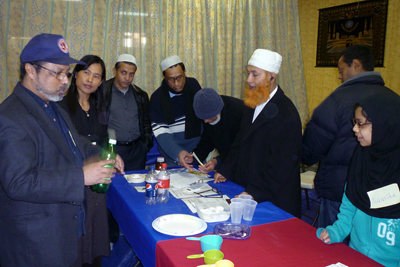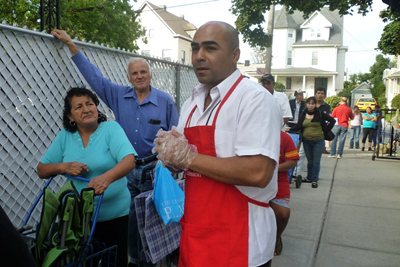Queens imam spreads the gospel of good eating
By Susan S. Lang

With a long red beard and dressed in a white robe and kufi (cap), the imam of a Queens, N.Y., mosque seems an unlikely candidate to spread nutrition advice from Cornell University Cooperative Extension-New York City (CUCE-NYC). But whenever he can, this imam prompts members of his mosque to sample soup without salt or oil or to try a bowl of oatmeal or a baked sweet potato for the first time. He cajoles youngsters to lay off the soda and encourages young Muslim mothers to breastfeed.
Abu Sayeed M.R. Amin, imam of the Woodhaven Jame-Masjid mosque, learned so much about healthful eating at a CUCE-NYC workshop series that he feels a responsibility to pass it on, he says. Like him, many of his congregants are immigrants from Bangladesh, though some are from India and Guyana.

Their traditional diets "use too much salt, sugar ... their cooking is oily and ... fried," said Amin, who is also director of the New York Islamic Cultural Center in Brooklyn. "Every day when we use this kind of food, our people face dangerous diseases like heart disease and diabetes [as well as] high cholesterol and high blood pressure." He visits congregants in the hospital, so he sees these diseases in his community all the time.
So he's been spreading the word through the imam network of Queens and Brooklyn -- even handing out flyers -- about CUCE-NYC's free series, Making the Most of Food. It's part of CUCE-NYC's Eat Smart New York program. Since 2009, the city's Human Resources Administration has granted some $4 million annually to CUCE-NYC to help New York's underserved populations improve their diets.
So far, CUCE-NYC has sponsored more than 150 workshop series -- each three hours weekly for eight weeks -- at faith-based organizations like Amin's mosque, says Khin Mar Cho, program coordinator of CUCE-NYC's Nutrition and Health Program, as well as at emergency food assistance sites, after-school programs, adult learning centers, community development centers, homeless shelters and senior centers.

"We also go to soup kitchens and food pantries [the city has more than 500] where hundreds of people start lining up at 5 a.m. sometimes, for the doors to open at 10," says Carol Parker-Duncanson, extension associate. Using "Lessons in a Box, all of them visual," her team goes down the line, for example, talking about the astonishing amount of sugar in soda, why sugar undermines diets, how important it is to cool down leftovers quickly -- using shallow containers if possible -- and why washing raw meat is a bad idea (it can contaminate the sink.)
Another arm of the project is CCE's Walkers for Wellness program, which inspired Amin to sponsor a 45-minute walk after morning prayers every Saturday and Sunday around the neighborhood -- indoors if the weather's inclement. Afterward, he treats walkers to a healthful breakfast of perhaps oatmeal, skim milk and fresh fruit. He sometimes take such opportunities, he says, to mention the virtues of brown rice, the importance of drinking eight glasses of water daily, baking and broiling instead of frying, consuming multiple servings of fresh fruits and vegetables, adding low-fat dairy to the diet, sipping green instead of red tea and ditching sugared sodas -- all tips he learned from CUCE-NYC.
Since taking the workshop series, Amin's mosque has also opened a soup kitchen of its own. Twice a week, the mosque opens its doors to the public for a healthful breakfast.
"We did not know [about how important these food changes were], but now we know," said Amin. "I have this knowledge now, my purpose is to give to others, and Allah will give me the reward [for doing this], that is my belief."
Get Cornell news delivered right to your inbox.
Subscribe